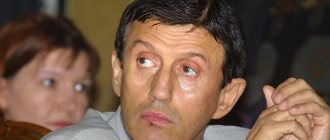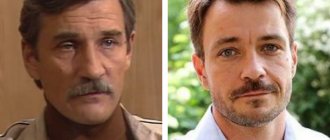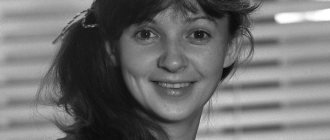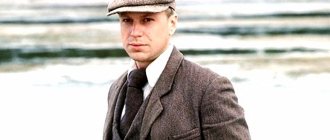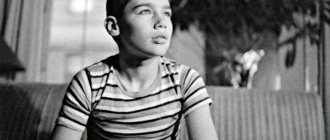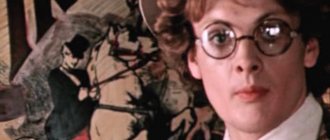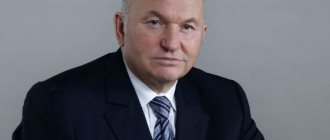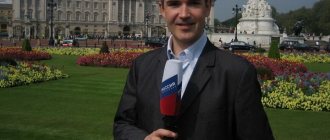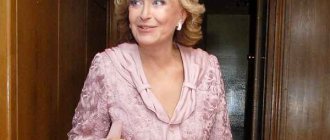Vyazemsky Yuri Pavlovich is one of the most prominent representatives of the Russian intelligentsia. He is known to a wide audience as the host of an intellectual program for schoolchildren called “Smart Men and Smart Girls.” However, this wonderful man has many different guises - he is a fairly well-known writer, professor, religious philosopher, and also the head of a department at the most prestigious university in the country. We will talk about this interesting person in this article.
View gallery
Origin
Vyazemsky Yuri Pavlovich comes from a famous and ancient noble family. Several of his closest relatives became famous in a variety of fields. More than one entertaining novel could be written about the history of this man’s family. The TV presenter’s grandfather had the last name Stankevich, was involved in the Tukhachevsky case and was convicted. After this, Yuri Pavlovich’s grandmother, in an attempt to protect her own son from persecution by the authorities, married a man of low origin. She herself belonged to an ancient Swedish family. This fact became decisive in her fate - soon after her marriage she was exiled and shot.
Little Pasha was lucky - he ended up in a foster family. He was adopted by Vasily Simonov (sculptor), who gave the boy his own surname and patronymic. Subsequently, Pavel Simonov became an academician, a famous biophysicist and psychologist.
Yuri’s second grandfather, Sergei Vyazemsky, was a major historian, the creator of a huge archive containing information about the history of St. Petersburg. This remarkable scientist was forced to renounce his noble roots throughout his life.
Yuri’s mother, Olga Sergeevna, worked as a foreign language teacher. The future TV presenter was born in 1951 on June 5, in Leningrad. He was born in the clinic of the Military Medical Academy, where his father, Pavel Vasilyevich, was studying at that time. Three years later, Yuri’s parents had a second child, Evgenia Simonova, a future movie star.
View gallery
Strange disease
Vyazemsky Yuri (Simonov on his father’s side) grew up in difficult conditions. In his early years, he was seriously ill, so he lived in the care of his grandfather and grandmother Vyazemsky. The nature of this strange illness could not be recognized by famous Leningrad professors. The fact is that the boy suddenly lost consciousness while maintaining all motor functions. In this state, he could suddenly fall from the bridge or run out onto the roadway. Everyone expected the disease to go away on its own. One day this happened. The day came when seizures literally tormented the weakened boy. It was probably a crisis because after that they stopped completely. And Yuri was finally able to move to the capital to his parents.
Childhood
All this time, the boy’s father and mother, together with their younger sister, lived in Moscow. The father of the future TV presenter entered service at the hospital named after. Burdenko, who was in the capital. Having recovered, Yura left his grandparents and moved in with his parents. The boy attended a music school at the Leningrad Conservatory and learned to play the violin.
The future celebrity did not do well at school. The boy had difficulty mastering the exact sciences, felt like a humanitarian, and did not immediately come to the final choice of his profession. As a child, Yuri Vyazemsky was fascinated by the stage - he dreamed of becoming a dancer or opera singer. After graduating from music school, he asked his mother to give him English lessons. Success awaited him in this field - the boy completed the basic program in just six months and transferred to study at an English special school. Now Yuri Pavlovich speaks five languages to varying degrees - French, German, English, Swedish and Spanish.
View gallery
Biography
Born on June 5, 1951 in Leningrad. The son of a Russian psychophysiologist, biophysicist, psychologist, academician Pavel Vasilyevich Simonov (1926-2002) and Olga Sergeevna Vyazemskaya (1924-1991). Brother of the popular theater and film actress Evgenia Simonova. Wife - Tatyana Aleksandrovna Smirnova - executive director of the TV-Obraz studio, editor-in-chief of the program "Clever Men and Smart Men"[2]. There are two daughters - Anastasia and Ksenia, as well as a stepson - Sergei. Grandchildren: Sergei (1994), Eliza and Olga (2001).
Graduated from the Faculty of International Journalism at MGIMO[3]. In 1978 he defended his thesis “Ideological and political struggle in the labor movement of the Scandinavian countries on the problems of Western European integration (late 60s - early 70s)” [4].
Worked for the magazine "International Life". In 1989 he created his first television program for youth - “Image”.
Author and presenter of the intellectual television Olympiad for high school students “Clever Girls and Clever Girls”; in 1996, 2006, 2014 and 2020, the television program won the highest television award “TEFI” in the category “Best Program for Children”, and in 2002 - in the category “Best Educational Program”.
He starred in a small episode in the film “Balamut” (1978) as an English teacher.
He speaks five languages to varying degrees: English, French, Swedish, German and Spanish[5].
Since July 26, 2010 - member of the Patriarchal Council for Culture (Russian Orthodox Church)[6].
Extravagant act
A year after receiving his MGIMO diploma, Vyazemsky committed, without exaggeration, the most extravagant act in his life. The guy bet with a friend that he could enroll as a free student at the famous Shchukin School. Yuri Vyazemsky’s sister was taking her first steps on the theater stage at this time. At this time she was a student at Shchuka and was in a very bright and interesting company. Her circle of friends included such famous actors as Leonid Yarmolnik, Yuri Vasiliev, and Stas Zhdanko. Yuri was so imbued with his sister’s success that he won his unusual argument and entered an artistic university. It was not easy - Vyazemsky went through the first two rounds relatively calmly. But on the third, the card “r” almost let him down. Vladimir Etush especially made fun of him. This infuriated the guy, and he performed the monologue of Shakespeare's Mark Antony so convincingly before the commission that he was immediately accepted. However, after studying for six months and getting rid of his speech impediment, the guy realized that he had made a mistake. Probably, the birth of the eldest daughter, Anastasia, also played a role. Four years later she had a sister, Ksenia.
View gallery
First literary experiments
Next, Yuri Vyazemsky directed his creative aspirations into the field of literature. He chose his mother’s maiden name as a pseudonym and henceforth became known to the general public not as Simonov, but as Vyazemsky. A talented writer has written several works. Among them is the story “The Guns Brought,” in which the actor became the hero. In 1982, Yuri Pavlovich’s first book was published. It published short stories and the psychological novel “The Jester,” in which a gifted teenager cruelly takes revenge on his offenders. The story gained great popularity, and an approving review was published in Literaturnaya Gazeta. In 1988, "The Jester" was filmed. The script was written by Vyazemsky himself. The film was watched by seven million people. Despite the resounding success, Yuri Pavlovich changed his creative direction and began to lean towards philosophy. As a result, a fundamental study entitled “On the Origin of Spirituality” was published in 1989. Yuri Vyazemsky wrote it together with his father, Pavel Simonov.
View gallery
Creation
Taking his mother’s surname as a pseudonym, Yuri Pavlovich directed his energies towards literary activity. In 1982, Vyazemsky published his first book, which included short stories and the novel “The Jester.” This work was highly praised in a review posted by the influential Literaturnaya Gazeta.
Yuri Vyazemsky
In the story, Vyazemsky explored the topic of moral education of youth. The main character of the young writer’s work is a young man endowed with intellectual abilities, who, out of resentment, begins to take revenge on others. In 1988, based on the story, director Andrei Eshpai made a film of the same name. The author of the work was hired to write the script.
But the writer did not delve into journalism, but took a different path. A year later, Yuri Vyazemsky released the philosophical work “On the Origin of Spirituality,” which he wrote together with his father Pavel Simonov. This was followed by scientific publications “And there is peace on earth” (1993), “Open letter to Ivan Karamazov” (1994), “The Armament of Odysseus” (2003).
Writer and TV presenter Yuri Vyazemsky
In 1993, the biography of Yuri Vyazemsky was enriched with another chapter: Yuri Pavlovich was appointed head of the department of world literature at MGIMO. He still works here today: he gives lectures in Russian and English on several disciplines of cultural and religious orientation. Yuri Vyazemsky is rightfully considered a cult teacher at MGIMO. According to colleagues, students treat him like their own father. In the joint photos that end up in the press, one can judge from the burning eyes of Vyazemsky’s students that this judgment is correct.
In the early 1990s, Yuri Vyazemsky began working on the ORT channel. The writer came up with and created a unique educational program for children and teenagers, “Smart Men and Women,” which at that time had no analogues anywhere in the world. The intellectual Olympiad for teenagers immediately gained high ratings. Every year, 7 winners of the TV show receive the right to study at MGIMO.
Yuri Vyazemsky in the program “Clever Men and Clever Girls”
Participants in each issue are given a month to prepare material on a given topic. The goal of the program is to prepare scholars for admission to a prestigious university in the country and to acquaint the public with the pages of world history and culture. According to Yuri Vyazemsky, he created this program for his own entertainment.
Vyazemsky’s program was awarded the TEFFI prize three times. In 2003 she received recognition abroad. At the television festival in New York, “Smart Men and Women” entered the finals of the competition.
Yuri Vyazemsky at a meeting with readers
Since 2010, Yuri Pavlovich has been publishing a series of books, which are based on the material used in the programs. These are collections of questions and answers in various fields of science. One of the popular publications in this series was the book “From Dante Alighieri to Astrid Erickson,” released in 2014.
In addition, at the same time, Yuri Vyazemsky began working on gospel-themed works “The Poor Parrot or the Youth of Pilate” (2012), “The Great Lover or the Youth of Pontius Pilate” (2013). The works represent a genre mixture of artistic, historical and philosophical views. The first book in this series was “The Childhood of Pontius Pilate: Difficult Tuesday,” written in the form of an autobiographical novel.
Working on television
Then, in 1989, the hero of our article began working on Central Television. At first, he hosted the youth program “Image,” built in the form of a literature quiz. Subsequently, due to new political trends, this project was closed. Then Yuri Vyazemsky, whose biography is very rich, went to work at Ostankino on the ORT television channel. Here he created the educational program “Clever Men and Smart Women.” This project has no analogues on any TV channel in the world. The intellectual show for schoolchildren, the victory of which ensured admission to MGIMO for seven participants, quickly became popular. He was awarded the Teffi Prize three times, and in 2003 the program reached the finals of the Television Festival held in New York. The host of “Clever Men and Clever Girls” Yuri Vyazemsky proved himself to be a brilliant showman, a magnificent artist who knows how to create intrigue in an academic intellectual show. His second wife, Tatyana Smirnova, helped him work on the program. In the past, she worked as a French language teacher, and then became the chief editor of the project and executive director of the TV-image television studio created by Yuri Pavlovich. No one, including the creator, could have thought that Smart Guys would last 22 years on television. Vyazemsky still does not consider himself primarily a writer, and not a famous media person.
View gallery
Yuri Vyazemsky, children
Most TV viewers know Yuri Vyazemsky as the permanent host of the intellectual (and there are fewer and fewer of them on television now every day) show “Clever Men and Clever Girls.” Considering the considerable age of this project, quite a few children have already grown up on it. There are also those among the readers of this blog who are familiar with the literary works of the hero of today’s article. Perhaps you will meet those whom he taught as a teacher at MGIMO. For all the variety of his hobbies and creative endeavors, the presenter and teacher admits that he almost never had enough time for his own children. And children of Yuri Vyazemsky - two natural daughters from his first marriage and an adopted son from his second.
In his interviews, the hero of our article more than once mentioned that he himself received education and upbringing virtually only through the efforts of his mother alone, since his father worked around the clock. Apparently, this model of upbringing in the family is inherited. However, Yuri Vyazemsky himself is confident that it was precisely because he witnessed firsthand how passionately his father worked that he himself grew up hardworking, purposeful and independent.
In the photo - the daughters of Yuri Vyazemsky
In the photo - Anastasia with her third husband and youngest son Andre
In his first marriage, Yuri Vyazemsky gave birth to two daughters, Anastasia and Ksenia, four years apart. Of course, both of them are already independent adults. The eldest daughter is currently 41 years old, and the youngest, respectively, 37 years old. Both daughters of Yuri Vyazemsky received higher education at prestigious universities. Anastasia is in literature, and Ksenia is in MGIMO. Unfortunately, Yuri Vyazemsky does not often see his daughters, since both of them live abroad with their husbands and families. Anastasia had to build a family life several times: after the death of her first husband in Lebanon, she married twice more. Now she lives in Switzerland with her third husband. She has a child from each spouse. The youngest daughter, Ksenia, is married to an Englishman, with whom she gave birth to two children - a daughter, Olga (named after her grandmother, that is, the mother of Yuri Vyazemsky) and a son, George.
In the photo - Yuri Vyazemsky with one of his granddaughters
Probably, much more often the TV presenter manages to meet with his son Sergei and his children. Despite the fact that Sergei Smirnov is not the natural son of Yuri Vyazemsky, their relationship is familial and trusting. Sergei mentioned in one of the programs that thanks to his stepfather he received a higher education, although in his youth he tried to direct his activities in a different direction. Now he doesn’t regret it at all. He is two years younger than the eldest daughter of Yuri Vyazemsky and the same amount older than the youngest. The son of Yuri Vyazemsky has three daughters. According to Sergei Smirnov, the presenter and his wife come to see them once every two to three weeks. Although this is not often, the family understands that even this time is not at all easy for the busy Yuri Vyazemsky.
Scientific activity
Yuri Vyazemsky has ebullient energy. “Clever Men and Smart Women” is a project in which its potential is far from being fully revealed. In 1993, Yuri Pavlovich, without leaving television, took up another serious and responsible matter - he took the post of head of the department of world literature at MGIMO. Now he lectures at this university in several disciplines of a cultural and religious nature in Russian and English. Among his scientific publications are the following:
- "The Armament of Odysseus."
- "And there is peace on earth."
- "Open letter to Ivan Karamazov."
Creative activity
The author of a number of works of fiction (the story “The Jester”, “The Justice Gang”, “The Guns Brought”, the novel “The Childhood of Pontius Pilate. Difficult Tuesday”, etc.), as well as scientific and popular science works (“The Origin of Spirituality”, “Armament” Odyssey”, etc.). Writer of the script for the film "The Jester".
Yuri Vyazemsky is famous for his statement on television that “an atheist is an animal, a sick person, he needs to be treated”[10]. Vyazemsky explained the resonance by saying that his words were taken out of context: “I spoke quite a lot, but, as it turned out later, during the editing process my words were severely cut, only excerpts taken out of context remained. As a result, the thought was distorted beyond recognition. And now journalists are circulating “information” that Yuri Vyazemsky considers atheists to be sick and animals”[11].
Literary works
Yuri Vyazemsky also manages to engage in literary activities. The books of this author are published with enviable popularity. In 2008, the writer offered the reader the series “Sweet Spring Baccurots,” which traces a mixture of genres - historical research, fiction, and philosophical essay. In addition to the main work, it includes the stories “The Childhood of Pontius Pilate” (2010), “The Poor Parrot, or the Youth of Pilate” (2012), “The Great Lover, or the Youth of Pontius Pilate” (2013). In addition, since 2010, the writer has been publishing a series of books based on materials from the program “Smart Men and Smart Girls.” They are collections of questions and answers in different areas of knowledge. The latest book in this series to date is “From Dante Alighieri to Astrid Erickson” (2014).
View gallery
Vyazemsky Yuri Pavlovich: family
Vyazemsky’s main assistant in working on the “Clever Men and Clever Girls” project is his second wife Tatyana Aleksandrovna Smirnova. She is a French language teacher by training, but for many years she has been the chief editor of the program and the executive director of the TV-image television studio created by her husband. The married couple has no children together, but Tatyana’s son Sergei always received paternal support from Yuri Pavlovich.
Yuri Vyazemsky's family supports him in all his endeavors. Since 2010, he has been working on publishing a series of books containing questions and answers on various areas of knowledge that were ever asked to participants in the Smart Guys program. The latest book in this series, published in 2014, is From Dante Alighieri to Astrid Erikson.
Personal life
Yuri Vyazemsky married twice. The first wife, classmate Irina, was the TV presenter’s school love. He recalls that he managed to interest a girl only after the ninth grade, when, having gone to Sverdlovsk, he learned to drink, smoke and perform Vysotsky’s songs with a guitar. The lovers married at the age of nineteen. This marriage produced two girls: Ksenia and Nastya. Vyazemsky’s eldest daughter graduated from the Literary Institute and became a translator, the youngest followed in her father’s footsteps and completed her studies at MGIMO. Both women live abroad. The youngest (Ksenia) is in London, she has a son, George, and a daughter, Olga. And the eldest (Nastya) married three times, and in each of these marriages gave birth to a child: in Switzerland, in Holland and in Iran. Thus, Yuri Pavlovich has five grandchildren from his first marriage. The TV presenter married Tatyana Alexandrovna Smirnova for the second time. In this marriage he has no children of his own, but he raised his stepson Sergei.
The children of Yuri Vyazemsky rarely meet with their famous father. He sadly notes that he is seen more often with his smart and smart people than with his close relatives.
Early marriage
One of the most significant figures of modern Russian literature is Yuri Vyazemsky. Biography, wife, children - all this interests numerous connoisseurs of his work.
His first muse and first wife was a classmate with whom he had been in love since the ninth grade. The young people got married when they were 19 years old.
In this marriage, Yuri Pavlovich had two daughters: the eldest Anastasia and the youngest Ksenia. Unfortunately, at a certain point the couple realized that their feelings for each other had cooled and separated. Now both daughters of Yu. Vyazemsky have started families themselves. The eldest Nastya has three children and lives in Switzerland. The youngest Ksenia has been living in London for a long time. She has a son, George, and a daughter, Olga.
Attitude to religion
As a highly intelligent and educated person, Yuri Pavlovich came to faith through various conclusions. He grew up in a family of atheists and never thought about God. His journey towards faith began through art and literature. At first, Vyazemsky was impressed by watching the rock opera “Jesus Christ Superstar.” His father brought him a recording of this masterpiece from America. The TV presenter thought about a lot when he first read “The Master and Margarita.” So Yuri Pavlovich’s coming to faith was specific. He did a lot of stupid things in his life, was often on the verge of life and death, but invariably overcame all obstacles. One day he thought about who to thank for the fact that he was still alive and unharmed. And I realized that I need to thank God. Now the TV presenter is sure that there is no death, and tells his students about this at lectures. In addition, Vyazemsky owns the phrase that an absolute atheist is close in his worldview to an animal. However, he immediately notes that there are few such people in the world. Most still believe in some Higher Power that protects them.
Someone saved me hundreds of times, and I even forgot to say thank you
—Has this injustice ever hurt you?
“She hurts me all the time.” And not so much in relation to me, because the Lord endured and commanded me. And it hurts when this injustice affects others, especially children. Just yesterday I watched a program about how young children suffer from incurable congenital diseases and the torment they and their loved ones endure. Of course it hurts, it hurts monstrously.
And at the same time, among these suffering children, I saw such smiles, such glances... These are the views of people who know how to enjoy the moment, who know how to rejoice, who perceive their every little success, small step towards recovery as a miracle. And I looked and envied them - because I, a generally healthy person, had forgotten how to be so happy, I don’t know how. But there are so many miracles happening in the world, but we have simply forgotten how to see them.
— What would you call a miracle in your life?
- Yes, for me my whole life is an absolute miracle, because in principle I should have died a hundred times already or something should have happened to me, but God constantly saved me. In fact, I began to believe seriously at one moment, when suddenly a series of terrible events appeared in front of me that could take me away from this world, and I realized that throughout my life Someone had helped me... And thank you Never told him yet.
Class of 1995
— If we return to the students and your explanations that every person is religious, then who, in your opinion, is easier to convince of this: a smart guy and a smart student or a student with a C grade? Or is there no dependence at all?
“I have always been against the idea that you absolutely have to convince people of this, because I have a completely different profession. I’m not a clergyman, I either teach a course on literature, or teach children to write, or teach the philosophy of culture. And if people want to be convinced, let them be convinced.
As for a smart guy and a smart student or a C student, this is generally a very difficult question. Einstein was a C student, Hegel received the characteristic that he was a complete idiot in the field of philosophy. It's not about whether you're a C student or a smart guy. But if a person asks questions that go beyond the scope of everyday life and stupid entertainment life, it is always easier to talk to him. Moreover, the subject of conversation can be anything: mathematics, chemistry, and metaphysics - everything ultimately leads to God. And when a person asks himself what death is, where did my mother go, what will happen to me after earthly life, then there is always a basis for conversation with him.
Conversation with future journalists. RANEPA Photo Service
— There are teachers thanks to whom their students came to God. Would you like it to be said about you: Yuri Pavlovich Vyazemsky not only informed us about the philosophy of culture and literature, but also became a guide for us into the world of faith?
— Of course, sometimes I sincerely want to help a person find the path to God, because living with faith in Him is simply much more joyful, much freer, much richer. I repeat, every person lives with faith, only faiths are different: sometimes destructive, sometimes very stupid, and so on. I am always killed by superficial atheists who try to take God away from people - but what will they give instead?!
I do not consider myself a missionary, although I have the Order of St. Innocent, first degree, for missionary work, and I understand that I need to earn this order.
Nowadays
Now Yuri Pavlovich is still very busy. He acts on television, teaches at the university, and writes new literary works. His main surroundings are books that fill the TV presenter’s huge office. This room is truly impressive in size. The fact is that Vyazemsky made a separate one-room apartment into an office, in which he lived with his wife Tatyana for twenty years. By luck, the couple managed to buy a house nearby. Therefore, while working, Yuri Pavlovich leaves his wife and goes to a neighboring apartment. Now Vyazemsky is working on another work about the life of Christ (there are 7 of them planned). This job makes him truly happy.
...And suddenly she says: “Your pride confuses me.”
— Recently, in an interview, you called modern youth the “selfie generation” and said that you really don’t like this trait. Isn't this the same manifestation of selfishness, characteristic of all generations at all times?
- Of course, this is selfishness. It’s just that I was once in Kazan, and one early morning while jogging I saw a girl riding a bicycle - and right while riding, all beaming, she took a selfie. She had everything provided for this - a selfie stick, everything as it should be. At some point I even became afraid that she might fall. This was truly a bright representative of the selfie generation. She simply filmed how she was driving, how good she felt: here I was, and then Kazan, and then everything else. And from that moment on, I began to pay attention to these selfies. Then one day my wife and I came to the Bolshoi Theater, and I saw how many people, before the start of the ballet, walked along the rows and took selfies: here I am at the Bolshoi Theater! And there was even a feeling that they didn’t need the ballet itself, that they had already done the most important thing and were ready to go home.
But I will tell one story about myself. Recently I visited one wonderful monastery, and Mother Superior looked at me so thoughtfully that I approached her and asked: “Is something bothering you?” - meaning that she is probably tormented as to where she could have seen my face. And I already wanted to tell her what was in the program “Clever Men and Wits.” But she, continuing to look at me just as intently, suddenly said with sadness: “Yes, your pride confuses me.” And it amazed me! Therefore, you can talk as much as you like about young people at my age - both about “selfies” and about “Pepsi”, but Mother Superior saw me well. She saw that I didn’t have one, as in the selfie, but that there were seven cameras pointed at my pride!
But, returning to modern students, a year after I saw this selfie in Kazan, I learned about a powerful movement that is now gaining strength, and I really hope that it will not be lost. This is a movement of volunteers, and in various fields - in organizing events, in helping orphanages, boarding schools, nursing homes... I saw these burning eyes, these united hearts and suddenly thought that this was the opposite effect of the selfie generation. One button on your phone is enough to turn the camera away from you and towards another person. And it’s no longer “I, who am so good, am driving along the sunny path,” but “I see the pain, I see the need to help, and I rush there.”
Photo by Alexander Gavrilov

